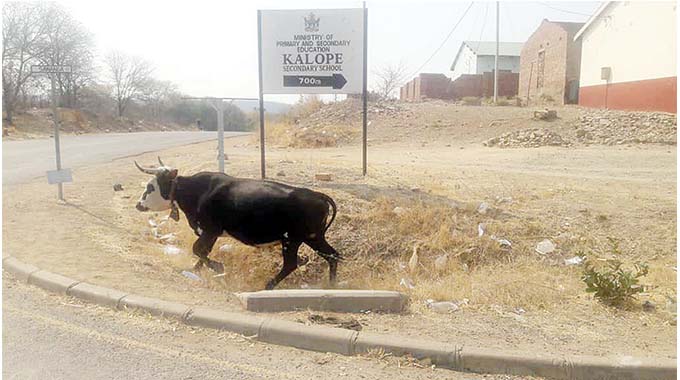
Leonard Ncube, Victoria Falls Reporter
LARGE herds of livestock have reportedly invaded Hwange urban area including the CBD as they migrate from nearby villages in search of water and pasture.
Cattle, donkeys, goats and sheep have literally camped mainly between Hwange Colliery Company general purpose offices and the district development coordinator’s offices along the main street connecting the Victoria Falls-Bulawayo Highway to the CBD.
Some animals are in Baboab low density suburb as well as Empumalanga and Chibondo high density which are under the jurisdiction of Hwange Local Board (HLB) while others are in the Hwange Colliery and National Railways of Zimbabwe concession areas especially in Number 1 and Lwendulu.
They stray into the urban area in search of water and grazing as streams have dried up in villages while boreholes are overwhelmed by both people and animals.
The animals are destroying gardens and water taps while also posing a traffic hazard as they haphazardly cross streets.
Cattle and donkeys come from surrounding peri-urban communities such as Cholibondo, Madumabisa, Makwa and St Mary’s goats and sheep belong to the Zimbabwe Prisons and Correctional Services.
The animals are either driven or left to stray into the urban areas to graze on vast stretches of green grass and drink water from numerous sewer streams.
A resident from Ward 5 in Empumalanga, Ms Margaret Chitonje said residents were now taking turns to guard gardens at night.
“People are no longer sleeping peacefully because of the noise as cattle move around. We have resorted to taking turns to guard our vegetables as residents and we appeal to authorities take action and locate the owners of these cattle,” said Ms Chitonje.
Greater Whange Residents Trust coordinator Mr Fidelis Chima said scores of residents have lost their gardens which have been destroyed by the animals.
He said some of the livestock strays into mining premises.
“There are many cattle and goats especially in Number 2, Number 5 and Empumalanga suburbs and residents are complaining about destruction of gardens and fruit trees. As you may know gardening is now a source of livelihood hence such destruction compromises the food situation for many families. Some of the animals are now even getting into mining premises which puts them at risk of them falling into mine pits.
“Our appeal is for the owners to take charge of their livestock and the local authority to strengthen by-laws and prevent this menace,” said Mr Chima.
The HLB which is haunted by illegal sand poachers who are causing land degradation, has warned owners of the livestock that they risk having their cattle, goats, donkeys and sheep auctioned following complaints by residents and motorists.
“Hwange Local Board is concerned about the ever-increasing number of cattle, goats and sheep roaming around suburbs. These stray animals are not only disturbing residents` peace, but are menacingly destroying vegetable gardens and also posing danger to motorists and pedestrians,” said HLB spokesperson Mr Dumisani Nsingo.
“To this end, council wishes to advise livestock owners to effectively control movement of their animals and guard against them encroaching into residential areas as they risk being penalised for contravening Council’s keeping of animals, reptile and birds by-laws (Statutory Instrument 359 of 1982, general restriction or keeping of animals Part Six Section 37).”
Some livestock owners reportedly construct pens on the outskirts of the town to enclose their animals at night.
HLB has impounded some of the animals and fined their owners before but the local authority is worried about the high number of repeat offenders.
The council also bears the cost of keeping impounded livestock before they are reclaimed by their owners. “In the past the council has had to destroy temporary cattle pens erected by villagers on the peripheries of Empumalanga suburb. Villagers tend to move their animals for relief grazing due to depleted pastures in their communal areas.
“Various initiatives are currently being explored to come up with more deterrent measures to curb uncontrolled movement of animals within residential areas, hence we would like to take this opportunity to warn these individuals that they risk facing more punitive measure, “ Mr Nsingo said.
He said those wishing to have their animals graze in the urban area should get written consent from the council.
Some donkeys belong to villagers who move around with donkey drawn carts selling firewood and manure.
“Council shall retain the right and power of seizure of animals which are found trespassing or straying. There will be sale, destruction or disposal of such animals if they are not claimed within two weeks, “ added Mr Nsingo.
He said fine is pegged at $280 per day per animal.
Mr Nsingo said the HLB will continue to invoke its by-laws to control livestock in the urban area and would soon construct holding pens for impounded animals.
Green Shango Environment Trust director Mr Daniel Sithole said the animals are also an environment hazard as they destroy exotic vegetation in the urban area. -@ncubeleon
